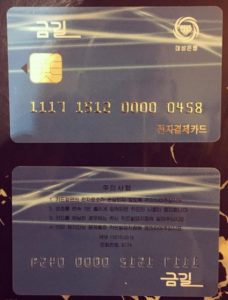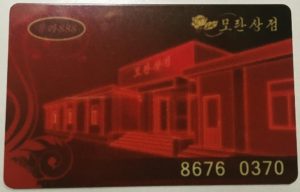On November 18, 2010, the US Treasury Department issued the following press release:
Treasury Designates Key Nodes of the Illicit Financing Network of North Korea’s Office 39
WASHINGTON – The U.S. Department of the Treasury today designated Korea Daesong Bank and Korea Daesong General Trading Corporation pursuant to Executive Order (E.O.) 13551 for being owned or controlled by Office 39 of the Korean Workers’ Party. Office 39 is a secretive branch of the government of the Democratic People’s Republic of Korea (North Korea) that provides critical support to North Korean leadership in part through engaging in illicit economic activities and managing slush funds and generating revenues for the leadership. Office 39 was named in the Annex to E.O. 13551, issued by President Obama on August 30, 2010, in response to the U.S. government’s longstanding concerns regarding North Korea’s involvement in a range of illicit activities, many of which are conducted through government agencies and associated front companies. Korea Daesong Bank is involved in facilitating North Korea’s illicit financing projects, and Korea Daesong General Trading Corporation is used to facilitate foreign transactions on behalf of Office 39.
“Korea Daesong Bank and Korea Daesong General Trading Corporation are key components of Office 39′s financial network supporting North Korea’s illicit and dangerous activities,” said Under Secretary for Terrorism and Financial Intelligence Stuart Levey. “Treasury will continue to use its authorities to target and disrupt the financial networks of entities involved in North Korean proliferation and other illicit activities.”
E.O. 13551 targets for sanctions individuals and entities facilitating North Korean trafficking in arms and related materiel; procurement of luxury goods; and engagement in certain illicit economic activities, such as money laundering, the counterfeiting of goods and currency, bulk cash smuggling and narcotics trafficking. As a result of today’s action, any assets of the designated entities that are within U.S. jurisdiction are frozen and U.S. persons are prohibited from conducting financial or commercial transactions with these entities.
You can learn more about the Treasury’s press release here.
Here is the US Treasury Department’s new North Korea resource page.
In response, the Daedong Credit Bank issued the following press release:
FOR IMMEDIATE RELEASE:
US Treasury Press Release 18th November 2010
London UK/Pyongyang DPRK, December 20th 2010
Daedong Credit Bank (DCB) has noted the press release of 18th November 2010 by the US Treasury and makes the following comments:
1. Korea Daesong Bank (KDB) is a 30% shareholder in DCB. DCB is not, and never has been, aware of any activity by KDB which is in breach of any of its obligations, domestic or international. In particular, DCB is not aware of KDB having acted in breach of any sanctions. DCB is not aware of any cause of concern about the conduct of KDB.
2. KDB has no executive control of DCB.
3. DCB is majority owned by overseas investors and is foreign-managed.
4. DCB does not act and has never acted in breach of any of its domestic or international obligations. DCB acts in a manner consistent with domestic and international law.
5. DCB is apolitical and promotes foreign investment in the DPRK as a positive development.
The Daedong Credit Bank looks forward to playing a significant part in facilitating normal commercial relationships between the DPRK and the international business community.
About Daedong Credit Bank
Daedong Credit Bank is a joint venture retail bank based in Pyongyang. It was established in 1995 as “Peregrine Daesong Development Bank”. The Bank underwent a change of name and foreign ownership in 2000.
Daedong Credit Bank is the first, by fifteen years, foreign majority held bank in the DPRK. DCB considers itself a flagship successful joint venture in the DPRK, and a key part of the infrastructure needed to assist the foreign-invested ventures, which drive the country’s economic reforms.
The bank’s principal function is to offer normal “high street” banking facilities in hard currency to; foreign companies, joint ventures, international relief agencies and individuals doing legitimate business in the DPRK.
Daedong Credit Bank was the first bank in the DPRK to introduce, and vigorously implement, a comprehensive set of anti-money laundering procedures. DCB’s anti-money laundering procedure manual was introduced seven years ago, and subsequently updated based on anti-money laundering guidelines provided by the Asian Development Bank. The manual has been sent to, and accepted by, DCB’s international correspondent banks.
Daedong Credit Bank also maintains strict procedures for the detection and rejection of counterfeit bank notes; it uses regularly updated note checking machines, and has personnel with over 10 years’ of experience of handling notes. DCB have encountered and impounded the so-called ‘superdollar’ notes, proving that these notes (despite media misconceptions) are not undetectable.
The wealth of experience garnered over Daedong Credit Bank’s 15 years of successful operation is unrivaled.
Daedong Credit Bank has a significantly strong position in relation to the future economic development of the DPRK and, being the oldest established foreign invested commercial bank in the DPRK, it is the intention of the bank to capitalise on these advantages.
CONTACT INFORMATION:
Daedong Credit Bank office address in Pyongyang is:
Daedong Credit Bank
401, Potonggang Hotel
Ansan-dong
Pyongchon District
Pyongyang
Democratic People’s Republic of Korea
Phone Switchboard +850 2 381 2228/9 ext 401
Direct line +850 2 381 4866
Mobile +850 193 801 8400 *
*Note, the mobile number may not be obtainable from certain countries (eg UK and Hong Kong).
Corporate Website www.daedongcreditbank.com
FOR IMMEDIATE RELEASE:
US Treasury Press Release 18th November 2010
London UK/Pyongyang DPRK, December 20th 2010
Daedong Credit Bank (DCB) has noted the press release of 18th November 2010 by the US Treasury and makes the following comments:
1. Korea Daesong Bank (KDB) is a 30% shareholder in DCB. DCB is not, and never has been, aware of any activity by KDB which is in breach of any of its obligations, domestic or international. In particular, DCB is not aware of KDB having acted in breach of any sanctions. DCB is not aware of any cause of concern about the conduct of KDB.
2. KDB has no executive control of DCB.
3. DCB is majority owned by overseas investors and is foreign-managed.
4. DCB does not act and has never acted in breach of any of its domestic or international obligations. DCB acts in a manner consistent with domestic and international law.
5. DCB is apolitical and promotes foreign investment in the DPRK as a positive development.
The Daedong Credit Bank looks forward to playing a significant part in facilitating normal commercial relationships between the DPRK and the international business community.
About Daedong Credit Bank
Daedong Credit Bank is a joint venture retail bank based in Pyongyang. It was established in 1995 as “Peregrine Daesong Development Bank”. The Bank underwent a change of name and foreign ownership in 2000.
Daedong Credit Bank is the first, by fifteen years, foreign majority held bank in the DPRK. DCB considers itself a flagship successful joint venture in the DPRK, and a key part of the infrastructure needed to assist the foreign-invested ventures, which drive the country’s economic reforms.
The bank’s principal function is to offer normal “high street” banking facilities in hard currency to; foreign companies, joint ventures, international relief agencies and individuals doing legitimate business in the DPRK.
Daedong Credit Bank was the first bank in the DPRK to introduce, and vigorously implement, a comprehensive set of anti-money laundering procedures. DCB’s anti-money laundering procedure manual was introduced seven years ago, and subsequently updated based on anti-money laundering guidelines provided by the Asian Development Bank. The manual has been sent to, and accepted by, DCB’s international correspondent banks.
Daedong Credit Bank also maintains strict procedures for the detection and rejection of counterfeit bank notes; it uses regularly updated note checking machines, and has personnel with over 10 years’ of experience of handling notes. DCB have encountered and impounded the so-called ‘superdollar’ notes, proving that these notes (despite media misconceptions) are not undetectable.
The wealth of experience garnered over Daedong Credit Bank’s 15 years of successful operation is unrivalled.
Daedong Credit Bank has a significantly strong position in relation to the future economic development of the DPRK and, being the oldest established foreign invested commercial bank in the DPRK, it is the intention of the bank to capitalise on these advantages.
CONTACT INFORMATION:
Daedong Credit Bank office address in Pyongyang is:
Daedong Credit Bank
401, Potonggang Hotel
Ansan-dong
Pyongchon District
Pyongyang
Democratic People’s Republic of Korea
Phone
Switchboard +850 2 381 2228/9 ext 401
Direct line +850 2 381 4866
Mobile +850 193 801 8400 *
*Note, the mobile number may not be obtainable from certain countries (eg UK and Hong Kong).
Corporate Website www.daedongcreditbank.com
#004


